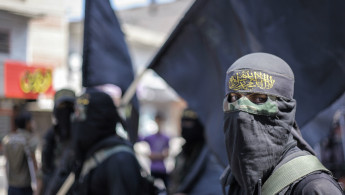Islamic Jihad rejects Israeli accusations of Syria rocket fire
Islamic Jihad rejects Israeli accusations of Syria rocket fire
Following an Israeli strike on Syria that was said to have targeted Islamic Jihad members, the group denied any attack on Israel launched from Syrian territory.
3 min read
The armed wing of the Islamic Jihad movement is known as the al-Quds Brigade [Getty]
Islamic Jihad operatives responsible for rocket fire into northern Israel were targeted in Syria, Israeli army spokesperson Peter Lerner has tweeted.
But the armed movement's spokesman, Daoud Shibah, on Friday morning that the attacks did not kill any Islamic Jihad members.
"We categorically deny that Islamic Jihad took responsibility for the rockets fired into the Galilee," Shibah told the Bethlehem-based Maan News.
Syrian state TV, meanwhile, reported that five civilians were killed in the Israeli attack on a car on the Syria border. Their deaths were confirmed by the Syrian Observatory for Human Rights, a UK-based opposition group, which said that two pro-regime militiamen were also among the dead.
Shibah added that such reports were "malignant" attempts to divert attention from Israeli crimes against prisoners such as hunger striker Mohammad Allan.
Mohammad Hindi, an Islamic Jihad leader, announced in Friday's press conference that the group would follow up on Israeli news reports and issue a full contestation of the accusations.
"Israel's accusation that the Islamic Jihad was behind the firing of rockets on Galilee are null and void, and they aim to cause confusion," said Hindi.
The group only fights on Palestinian territories - a central part of the group's manifesto, he added.
Shibah said that Islamic Jihad knew "how, when and where" to resist the Israeli occupation, and made a reference to Thursday's deployment of Israel's Iron Dome missile defence system near Ashkelon.
The deployment was reportedly made amid fear of retaliation from Gaza if hunger-striking Mohammad Allen were to die.
Islamic Jihad is said to have recently faced a funding shortfall, with Iran withdrawing much of its support after the group refused to support Tehran's stance on Yemen.
The group has been supporting the Hamas ceasefire with Israel - a factor that is thought to have motivated attacks on Islamic Jihad and Hamas vehicles in Gaza during the past month.
The group is predominantly active in Gaza, and there have been no previous reports to suggest that it has been active in Syria - although, unlike Hamas, it did retain relations with Bashar al-Assad following the start of the Syrian uprising.
Ramdan Shalah, a prominant Islamic Jihad leader who is said to have particularly close relations with the Syrian regime, has not supported getting involved in the Syrian conflict, despite Hizballah's intervention.
Islamic Jihad supporters on social media cited the movement's co-founder, Fathi Shiqaqi, who said that following the events of Black September - in which Palestinian militants became embroiled in conflicts with the Jordanian army - armed Palestinian groups have avoided interference in Arab nations' affairs, and confined their operations to Palestinian territory.
But the armed movement's spokesman, Daoud Shibah, on Friday morning that the attacks did not kill any Islamic Jihad members.
"We categorically deny that Islamic Jihad took responsibility for the rockets fired into the Galilee," Shibah told the Bethlehem-based Maan News.
Syrian state TV, meanwhile, reported that five civilians were killed in the Israeli attack on a car on the Syria border. Their deaths were confirmed by the Syrian Observatory for Human Rights, a UK-based opposition group, which said that two pro-regime militiamen were also among the dead.
Shibah added that such reports were "malignant" attempts to divert attention from Israeli crimes against prisoners such as hunger striker Mohammad Allan.
 |
|
| Aftermath of the Israeli bombing in Queintra on the Syria border [facebook] |
"Israel's accusation that the Islamic Jihad was behind the firing of rockets on Galilee are null and void, and they aim to cause confusion," said Hindi.
The group only fights on Palestinian territories - a central part of the group's manifesto, he added.
Shibah said that Islamic Jihad knew "how, when and where" to resist the Israeli occupation, and made a reference to Thursday's deployment of Israel's Iron Dome missile defence system near Ashkelon.
The deployment was reportedly made amid fear of retaliation from Gaza if hunger-striking Mohammad Allen were to die.
Islamic Jihad is said to have recently faced a funding shortfall, with Iran withdrawing much of its support after the group refused to support Tehran's stance on Yemen.
The group has been supporting the Hamas ceasefire with Israel - a factor that is thought to have motivated attacks on Islamic Jihad and Hamas vehicles in Gaza during the past month.
The group is predominantly active in Gaza, and there have been no previous reports to suggest that it has been active in Syria - although, unlike Hamas, it did retain relations with Bashar al-Assad following the start of the Syrian uprising.
Ramdan Shalah, a prominant Islamic Jihad leader who is said to have particularly close relations with the Syrian regime, has not supported getting involved in the Syrian conflict, despite Hizballah's intervention.
Islamic Jihad supporters on social media cited the movement's co-founder, Fathi Shiqaqi, who said that following the events of Black September - in which Palestinian militants became embroiled in conflicts with the Jordanian army - armed Palestinian groups have avoided interference in Arab nations' affairs, and confined their operations to Palestinian territory.



